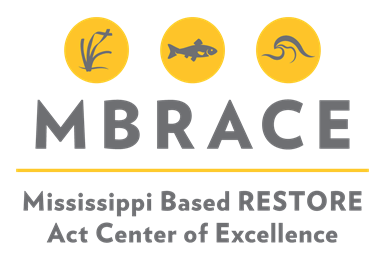
Oyster reefs are important coastal ecosystems worldwide, and they provide critical ecosystem services for mankind. However, in recent years there has been a global decline in oyster populations and concurrent losses to coastal economies and associated ecosystem services. This is particularly apparent along the Mississippi Gulf Coast where oyster landings have declined significantly over the past decade. The State of Mississippi has committed to an oyster reef restoration strategy in an effort to facilitate sustainable landings of one million sacks per year by 2025.
In 2017, a team of student and faculty researchers at the University of Mississippi received funding from the Mississippi Based RESTORE Act Center of Excellence (MBRACE) to examine differences in environmental and biological stressors at current and historic oyster reef sites in order to better understand oyster reef health and inform management regarding the best places and practices to improve oyster reef restoration strategies.
The team is deploying innovative “ocean observing stations” at several sites in the Bay of St. Louis and the Mississippi Sound to collect data on temperature, salinity, dissolved oxygen, and other environmental conditions. These stations also contain oysters so the team can measure oyster responses to stressors, such as metals, fecal coliforms, and Dermo disease.
 The Mississippi Based RESTORE Act Center of Excellence (MBRACE) is Mississippi's Center of Excellence under the RESTORE Act's Center of Excellence Research Grants Program. MBRACE is a consortium of Mississippi’s four research universities (Jackson State University, Mississippi State University, The University of Mississippi, and The University of Southern Mississippi), with USM serving as the lead institution.
The Mississippi Based RESTORE Act Center of Excellence (MBRACE) is Mississippi's Center of Excellence under the RESTORE Act's Center of Excellence Research Grants Program. MBRACE is a consortium of Mississippi’s four research universities (Jackson State University, Mississippi State University, The University of Mississippi, and The University of Southern Mississippi), with USM serving as the lead institution.
This project was paid for with federal funding from the Department of the Treasury under the Resources and Ecosystems Sustainability, Tourist Opportunities, and Revived Economies of the Gulf Coast States Act of 2012 (RESTORE Act). The statements, findings, conclusions, and recommendations are those of the author(s) and do not necessarily reflect the views of the Department of the Treasury.
Aquatic Invasive Species in Mississippi
Model Bait Regulation for Limiting Invasive Species
Researching the Health of Oyster Reefs in Mississippi
CRS and the Program for Public Information
Dauphin Island Climate Resilience Study
Oyster Aquaculture in the Gulf of Mexico
Stay current with the latest news and information from the MASGLP. Subscribe to our newsletter today!
Mississippi-Alabama Sea Grant Legal Program
256 Kinard Hall, Wing E
P.O. Box 1848, University, MS 38677
Phone (662) 915-7775 • Fax (662) 915-5267










